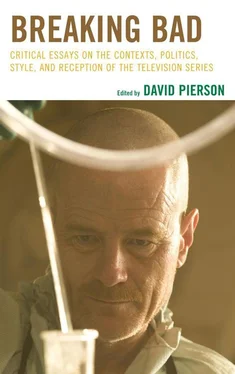An early scene of Walter shows him struggling in vain to motivate a class of seemingly disinterested and bored high school students to the wonders of chemistry. Earlier in the same pilot episode (1/20/08), we see the early-rising Walt staring at a plaque on the wall of his home awarded to him in 1985 for his contribution to research that led to the Nobel Prize in chemistry. One can surmise that because he is married and has a son with cerebral palsy, he gave up the lucrative, entreprenuerial field of scientific research in favor of the security of a teaching position. As a school teacher, Walt is part of a public institution probably most derided by neoliberal critics as incompetent, ineffective, and an implicit threat to individual freedom, even democracy. Neoliberal ideologues often scorn the civil servants who work for public institutions. And, while politicians and civic leaders frequently laud the importance of school teachers in our society, at the same time they reduce funding to school districts and favor privately-run charter schools. The reality for most teachers, especially for those living in the American Southwest, is a career marked by low-pay and limited job benefits. Walt has to work a part-time job as a cashier at a car wash after school and on the weekends to support his family. When one of the car wash employees does not show up for his shift, Walt’s boss presses him to fill in by washing cars. Walt is humiliated when two of his students laugh, take pictures, and poke fun at the sight of Mr. White washing their car.
Walt is a tired, unhappy, overworked, and emasculated middle-aged man. Skyler (Anna Gunn), his pregnant wife, switches out his breakfast bacon for veggie bacon to lower his cholesterol, repeatedly reminds him to do home chores, tells him to stand up to his boss at the car wash about not working late, and chides him for being late for his surprise fiftieth birthday party. At the party, Walt is further emasculated by his bombastic brother-in-law Hank Schrader (Dean Norris), who is a DEA (Drug Enforcement Agency) agent and supervisor, is showing off his Glock 22 handgun to Walt’s son. Hank hands the gun to a hesitant Walt and then comments about the absurdity of the sight with Walt holding a firearm. Hank, who clearly relishes the attention he receives at being a federal agent, interrupts Walt’s party to view himself being interviewed on a television news story concerning a DEA bust of a meth lab in which agents seized over seven-hundred thousand dollars in cash. Hank, noting Walt’s interest in the bust, offers him a ride-along during their next drug bust. He follows up his offer with a hearty laugh saying that Walt needs to put a little excitement in his stale life. Following the party, Walt’s emasculation is culminated in bed when Skyler both sexually satisfies him as a personal birthday present while at the same time attending to her bid on an item from an Internet auction site on her laptop. In the bedroom, Walt is as passive as he is in his life. He appears patient and grateful to receive the sexual attention, even if it is obligatory, from his preoccupied wife. The pilot episode suggests that Walt is suffering from a personal crisis of masculinity and that it is likely linked to his regret in not taking the risks of becoming a research scientist combined with his dependence on the staid security of a low-paying public sector job.
Walt’s moral and psychological maladies assume a distinct physical form. Earlier, on the same day as his birthday party, he collapses washing cars at the car wash. On the way to the hospital, Walt asks the ambulance attendant to let him out because he has terrible health insurance. Walt learns that he has inoperable, advanced stage lung cancer. Despite Susan Sontag’s (2001) admonition to not perceive of physical illness in metaphoric terms, one cannot help but think that Walt’s body is revolving against his systemic passivity and inability to assert his will in his life. Sontag argues that cancer has become the predominant disease metaphor in our culture. It is considered a disease of repression, or inhibited passion. The cancer sufferer characteristically suppresses emotion, which after many years emerges from the unconscious self as malignant growth (Sontag). Metaphorically, one could say that Walt’s body is revolting against his repressive nature and lifestyle, and a last warning to change his life. Cancer, of course, is associated with death and is disturbing to its victims because it reminds them that their death is imminent.
NEOLIBERALISM, CRIMINALITY, AND ENTREPRENEURISM
Classical liberalism and the welfare state era conceived of crime as an aberrant event that can only be resolved through the proper functioning and direct intervention of such social institutions as the family, education, and job opportunities. The criminal was a social deviant who diverged established social norms. The welfare state believed that crime can only be reduced through state intervention and the criminal can be socially rehabilitated to fit back into normal society. In contrast, neoliberal criminology disassociates itself from any social, psychological, and biological explanations of crime and criminal behavior (Lemke 2001). Crime is viewed as a routine event committed by persons who make a particular choice among many choices. Neoliberal criminologists believe the crime can occur anywhere and can never be completely eliminated. The only ways to reduce crime is through individual vigilance, surveillance, penal disincentives, and proper zoning in potential high crime areas (Herbert and Brown 2006).
Under neoliberal criminology, the criminal is not a product of a psychological disorder or a genetic defect but rather is a typical person. The criminal is a rational-economic actor who contemplates and calculates the risks and the rewards of his actions. Crime is no longer a deviant activity outside the mainstream market, but is rather one market among others. Neoliberal penal theory controls and regulates the market for crime by increasing the costs or penalties of committing crime and accepts the fact that crime cannot completely be eliminated from society (Lemke). Examples of neoliberal penal reforms include mandatory imprisonment sentences, such as the “Three Strikes and You’re Out” law, to the popular “Zero Tolerance” school policies for students caught with any weapon (Wacquant 2009; Ismaili 2003). Loic Wacquant (2009) asserts that the neoliberal turn in penal theory with its strict penal categories, practices and policies have led to the formation of a “grand penal state” in the United States. For the past twenty-five years, the prison population has increased fivefold and now encompasses seven million Americans which corresponds to one adult male in twenty and one black man in three. Wacquant argues that the rise of a penal state in the United States is not a respond to the rise of crime, which remained constant in the time period, but rather is a response to the social dislocations caused by the decline of the welfare state and the insecurities associated with low wage labor for citizens trapped at the bottom of a polarizing class structure (xiv-xv).
At the center of neo-liberalism’s conception of subjectivity is the concept of self-care or the accepted premise that each person is responsible for him or herself. Individuals must assume responsibility for their well-being and personal development in a market-driven society. The individual must take responsibility for his or her well-being and development. Thomas Lemke (2001), examining Foucault’s lectures on the discourses of neoliberal governmentality, says that neoliberal forms of government do not necessarily lead to the state assuming a reduced role in social life. In fact, the state devises new strategies for leading and controlling individuals without being responsible for them. Neoliberal governments function to produce self-governing individuals while shifting the responsibility for such social risks as illness, unemployment, crime and poverty, and social life in general into the domain of personal self-care (Lemke).
Читать дальше












